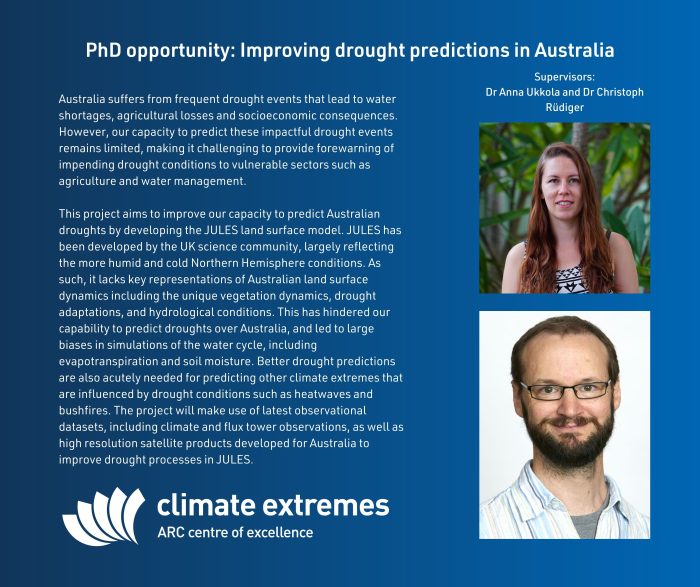
Australia suffers from frequent drought events that lead to water shortages, agricultural losses, and socioeconomic consequences. However, our capacity to predict these impactful drought events with sufficient lead time remains limited, making it challenging to provide forewarning of impending drought conditions to vulnerable sectors such as agriculture and water management.
This project aims to improve our capacity to predict Australian droughts by further developing the JULES land surface model to better represent Australian conditions. JULES has been developed by the UK science community, largely reflecting the more humid and cold Northern Hemisphere conditions. As such, it lacks key representations of Australian land surface dynamics including the unique vegetation dynamics, drought adaptations, and hydrological conditions. This has hindered our capability to predict droughts over Australia and led to large biases in simulations of the water cycle, including evapotranspiration and soil moisture. Better drought predictions are also acutely needed for predicting other climate extremes that are influenced by drought conditions such as heatwaves and bushfires. The project will make use of latest observational datasets, including climate and flux tower observations, as well as high resolution satellite products developed for Australia to improve drought processes in JULES.
The project is based at the Climate Change Research Centre (CCRC) at the University of New South Wales (UNSW), Australia, and will be undertaken jointly with the Bureau of Meteorology’s Hydrological Modelling team who are the key developers of JULES in Australia. The project will be supervised by Dr Anna Ukkola (UNSW) and Dr Christoph Rüdiger (Bureau of Meteorology). The successful candidate will become part of the Australian Research Council Centre of Excellence for Climate Extremes, an international research consortium of five Australian universities (The University of New South Wales, Monash University, The University of Melbourne, The University of Tasmania and The Australian National University) and a suite of outstanding national and international Partner Organizations. The Centre provides excellent opportunities for travel and graduate student development. In addition, the successful candidate will have the opportunity to collaborate on operational model development and work together with staff of the Bureau’ Hydrological Modelling team.
We are looking for expressions of interest from highly motivated graduates with a strong academic record (e.g. Honours Class I or Masters by Research or equivalent). Graduates with a strong background in hydrology, ecology, mathematics, physics, atmospheric science, climate science, engineering or similar quantitative sciences are particularly encouraged to apply. Programming experience with (or willingness to learn) R, Python or similar language is essential.
Questions should be directed to Anna Ukkola (a.ukkola@unsw.edu.au). Expressions of interest including a CV, full academic transcript, and the names of up to three academic referees should be sent to climate.grad@unsw.edu.au by the 19th of April, 2023. Note: this is not an official application, if your expression of interest is accepted, we will guide you through the application process.
